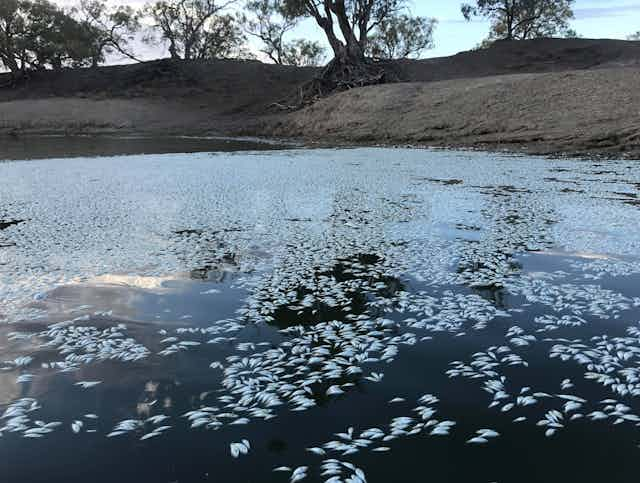In the wake of revelations of water theft, fish kills, and towns running out of water, the South Australian Royal Commission into the Murray-Darling Basin has reported that the Basin Plan must be strengthened if there is to be any hope of saving the river system, and the communities along it, from a bleak future.
Evidence uncovered by the Royal Commission showed systemic failures in the implementation of the Murray-Darling Basin Plan. The damning report must trigger action by all governments and bodies involved in managing the basin.
The Basin Plan was adopted in 2012 to address overallocation of water to irrigated farming at the expense of the environment, river towns, Traditional Owners, and the pastoral and tourism industries.
The Commission has made 111 findings and 44 recommendations that accuse federal agencies of maladministration, and challenge key policies that were pursued in implementing the plan.
Read more: Aboriginal voices are missing from the Murray-Darling Basin crisis
What did the report find?
The commission found that the Basin Plan breached federal water laws by applying a “triple bottom line” trade-off of environmental and socioeconomic values, rather than prioritising environmental sustainability and then optimising socio-economic outcomes.
I and my colleagues in the Wentworth Group of Concerned Scientists provided evidence to the commission from our independent assessment of the Basin Plan in 2017, which the commission’s findings reflect.
Contrary to current government practices, the Commission recommendations include:
- prioritising environmental sustainability
- basing the plan on transparent science
- acquiring more water for the environment through direct purchase from farmers
- meeting the water needs of the Basin’s 40 Indigenous nations
- ensuring that state governments produce competent subsidiary plans and comply with agreements to remove constraints to inundating floodplain wetlands
- addressing the impacts of climate change
- improving monitoring and compliance of Basin Plan implementation.
Resilience in decline
The Murray-Darling Basin is not just a food bowl. It is a living ecosystem that depends on interconnected natural resources. It also underpins the livelihoods of 2.6 million people and agricultural production worth more than A$24 billion.
The continued health of the basin and its economy depends on a healthy river – which in turns means healthy water flows. Like much of Australia, the Murray-Darling Basin is subject to periods of “droughts and flooding rains”. But over the past century the extraction of water, especially for irrigation, has reduced river flows to a point at which the natural system can no longer recover from these extremes.
That lack of resilience is evidenced by the current Darling River fish kills. More broadly, overextraction risks the health of the entire basin, and its capacity to sustain productive regional economies for future generations.
From the perspective of the Wentworth Group, we support the commission’s main recommendations, including increasing pressure on recalcitrant state governments to responsibly deliver their elements of the plan, and to refocus on the health of the river.
We particularly support recommendations related to the use of the best available science in decision-making, including for managing declining water availability under a changing climate.
We welcome the recommendation to reassess the sustainable levels of water extraction so as to comply with the Commonwealth Water Act. These must be constructed with a primary focus on the environment.
In line with this, the 70 billion litre reduction in environmental water from the northern basin adopted by parliament in 2018 should be immediately repealed. So should the ban on direct buyback of water from farmers for the environment.
We also recognise that the Basin Plan’s water recovery target is insufficient to restore health to the environment and prevent further damage, and would welcome an increase in the target above 3,200 billion litres.
Read more: A good plan to help Darling River fish recover exists, so let's get on with it
South Australian Premier Steven Marshall has taken a welcome first step in calling for a Council of Australian Governments meeting to discuss the commission’s findings. Our governments need to avoid the temptation to legislate away the politically inconvenient failings exposed by the commission, and instead act constructively and implement its recommendations.
This is not only a challenge for the current conservative federal government. The Labor side of politics needs to address its legacy in establishing the Murray-Darling Basin Authority and the Basin Plan, as well as the Victorian government’s role in frustrating the plan’s implementation by failing to remove constraints to environmental water flows.
Now, more than ever, we need strong leadership. If the Murray-Darling Basin Plan fails, we all lose.

